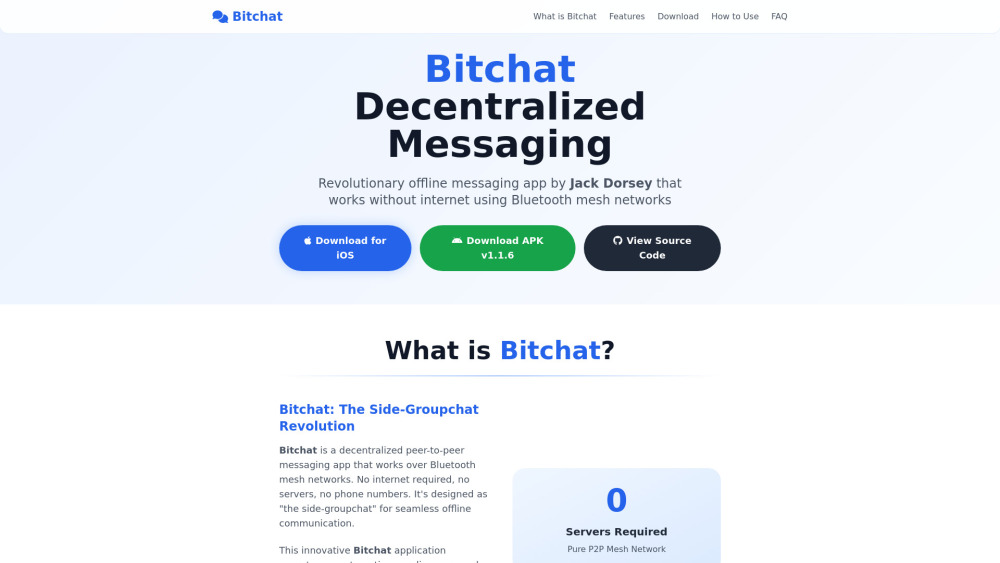FAQ from Bitchat
-
What is Bitchat and who created it?
-
How does Bitchat's mesh network work?
-
What are Bitchat's security features?
-
How can I download and install Bitchat?
-
How does Bitchat optimize battery usage?
-
What makes Bitchat's protocol efficient?
-
How does message storage work in Bitchat?
-
What are Bitchat's main use cases?
-
Is Bitchat open source and what's the license?
-
What's Bitchat's current development status?
FAQ from Bitchat
What is Bitchat?
Bitchat is a cutting-edge, decentralized messaging tool that operates entirely offline using Bluetooth mesh technology. Created with privacy and resilience in mind, it enables real-time communication without servers, SIM cards, or internet access. Every device acts as a node in a distributed network, supporting automatic peer detection and message relaying across multiple hops—making it perfect for off-grid scenarios, disaster response, or uncensored dialogue.
How to use Bitchat?
To start using Bitchat, download the app for iOS or Android from the official GitHub page or build it locally using XcodeGen. Upon opening, choose a display name and allow Bluetooth permissions. The app will automatically detect other Bitchat users nearby. Use commands like `/j #london` to join topic-based channels, `/m @alice Hi there` to send encrypted DMs, or `/channels` to browse available discussions. Messages travel through intermediate devices to reach distant participants, creating a robust, ad-hoc communication web.
What is Bitchat and who created it?
Bitchat is an open, permissionless messaging protocol designed for offline, secure, and censorship-resistant communication. It was initiated by Jack Dorsey as part of a broader effort to decentralize digital interaction. Released into the public domain, the project encourages global collaboration and unrestricted innovation.
How does Bitchat's mesh network work?
The Bitchat mesh leverages Bluetooth LE to create a decentralized web of connected devices. Using TTL-limited broadcasts (up to 7 hops), messages are routed dynamically through intermediate peers. Automatic discovery, deduplication via unique IDs, and adaptive connection management ensure stable performance even in dense user environments.
What are Bitchat's security features?
Security is foundational: end-to-end encryption uses X25519 for key exchange and AES-256-GCM for content protection. Channels use Argon2id-derived keys with b encryption, while Ed25519 signatures verify authenticity. Forward secrecy and an emergency triple-tap wipe enhance personal safety—though note that private features remain unaudited.
How can I download and install Bitchat?
Bitchat offers pre-built apps for iOS (direct install) and Android (APK v1.1.6). It supports iOS 16+, macOS 13+, and modern Android versions, ensuring broad cross-platform interoperability. Developers can also compile from source using the provided build tools.
How does Bitchat optimize battery usage?
Bitchat employs a five-level adaptive power system: Performance, Balanced, Power Saver, Ultra-Low Power, and Background modes. Scanning intervals adjust based on battery level and activity, minimizing energy drain while maintaining network presence.
What makes Bitchat's protocol efficient?
The protocol uses LZ4 compression (reducing data size by 30–70%), compact binary formatting, Bloom filters for duplicate suppression, and message batching. These optimizations maximize throughput and minimize latency over constrained BLE links.
How does message storage work in Bitchat?
By default, all messages are ephemeral—stored only in RAM and deleted upon exit. Channel admins may enable persistent storage with `/save`, and the store-and-forward system holds messages for offline users until they reconnect.
What are Bitchat's main use cases?
Bitchat excels in environments lacking reliable internet—such as rural regions, underground spaces, protest zones, natural disasters, or international travel—where traditional apps fail but local communication remains critical.
Is Bitchat open source and what's the license?
Yes, Bitchat is fully open source and placed in the public domain. This permissive approach allows anyone to use, modify, distribute, or commercialize the code without restrictions, promoting transparency and community-driven evolution.
What's Bitchat's current development status?
Bitchat is actively evolving. Core functionality—including public chat and mesh networking—is stable and functional. Private messaging and channel encryption are implemented but have not yet undergone independent security audits. The long-term goal is a scalable, cross-platform protocol framework for decentralized communication.
